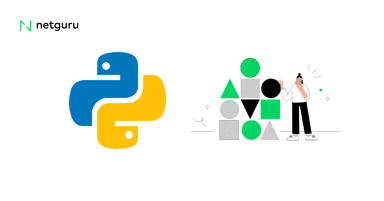Python & Django – Great Technologies for Your Fintech Product

Successful fintech companies such as Revolut, Stripe or Coinbase, reach multi-billion-dollar valuations and enjoy global customer recognition. However, in order for your business to become the next fintech unicorn, you first need to build a modern, reliable, and fully featured application.
Choosing the right technology for your fintech application can be difficult, especially given the requirements it has to meet to fulfil its purpose well. In this article, we’re going to go over the particular requirements that fintech applications have and explain why we believe that Python and Django are great technologies to go with.
Fintech requirements
Obviously, fintech applications require different things from their underlying technology than, say, mobile games. Based on our experience, we have identified six main areas that are especially important for financial technology companies.
- Uniqueness. There are more and more fintech startups springing up every day. To achieve a significant success, your project must stand out from the market. You need to have a unique value proposition, a specific niche, or execute your idea so well that others just won’t be able to compete.
- Security. Few things are as sensitive and as sought after as money and financial data. A fintech application obviously deals with both. This means it has to be absolutely bulletproof with regards to access and data protection. Remember that even a small breach can do irreparable damage to the trust your brand has earned.
- Reliability. On the Internet, we expect things to be available instantly and at all times. This is especially true when it comes to your users’ money. Downtime is unacceptable when it comes to financial services.
- Agility. As a fintech company, you’re fighting against industry giants, some of whom have been on the market for literally hundreds of years. Your technology must enable you to build, grow, adapt, and improve your product quickly. Going to market quickly is absolutely essential.
- Data processing. One of the main resources of financial companies is what they know about their customers – their purchasing patterns, credit scores, income, and much more. Managing and analyzing this data requires you to use a technology that is well-suited for data science applications.
- Flexibility. No company exists in a vacuum. Your platform has to be flexible so that it can be easily integrated with other systems and applications.
Meeting all the six requirements above can seem like a tall order, but we’ve found that the combination of the Python programming language and Django framework fit the bill perfectly. Let us explain why.
Pros of Python
Python is extremely popular – and continues to become more so – for a number of reasons. The same reasons make it a perfect fit for fintech applications.
First, let’s consider the security aspect. Python was first released in 1991, which means that many generations of developers have worked hard for decades to make it as attack-proof as possible. Moreover, Python code is typically clean, terse, and free of boilerplate, which means a smaller attack surface for malicious actors. This is also the reason behind its world-class reliability. Simply put – the less code you have, the fewer things can go wrong.
Then, there’s agility. We can’t think of a programming language that’s easier to learn and write in than Python. This means that your development team doesn’t need to spend precious time learning about esoteric interactions and bizarre behaviors. Instead, they can focus on building new features and will be able to do so quickly.
is practically synonymous with Python. The language has an impressive number of powerful libraries that can be used to crunch truly enormous amounts of data. Numpy, Pandas, Matplotlib, Scikit-Learn, Scipy are merely a few of the amazing offerings out there – and they all are completely free and open-source.
Finally, there’s flexibility. Making a Python app talk to another one can be as easy as importing a single module. It doesn’t really get any better than this.
Joys of Django
Django, a Python-based web framework, has all the benefits of Python itself but also brings several unique advantages to the table. One advantage is that you can quickly build an MVP (minimum viable product). With this comes the flexibility to quickly adapt to customer expectations and new financial regulations – a godsend for up-and-coming fintechs. In addition, Django battle-proven – global companies have been using it for 13 years, and it’s not going anywhere. This means that you don’t have to worry about unexpected bugs or failures. Then there are the multiple built-in features. Django comes with a lot of stuff already included, meaning that developers don’t have to reinvent the wheel every time they start working on a new fintech application. This means that more of your precious resources can be directed to mission-critical work. Finally, Django makes it really simple to build REST APIs, making integrations with other systems (such as banking platforms) a much simpler task.
Wrapping up
Based on our experience, we have found that technologies used for fintech applications need to fulfil six main requirements. They must enable you to build a unique product, with world-class features, and allow you to maintain agility and flexibility during development. The duo of Python and Django fits the bill perfectly, and we consider our successful fintech projects built using these technologies to be the ultimate proof of that.
If you’re looking for advice on building a fintech product, make sure to get in touch. Our team of experts will be happy to help you find the right solution for your business.
-873149-edited.jpg?width=50&height=50&name=Tomaszuk%20Daniel%201%20(2)-873149-edited.jpg)
-873149-edited.jpg?width=260&height=260&name=Tomaszuk%20Daniel%201%20(2)-873149-edited.jpg)


















